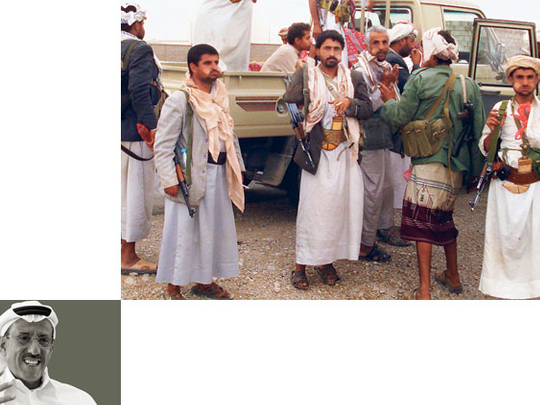
When the world is focused on the uprisings in Egypt, Syria and the President of Yemen's agreement to step aside, the spotlight has been diverted from the threat posed by Yemen's Al Houthi Zaidi Shiite, pro-Iranian rebels.
With an estimated 100,000 fighters, the Al Houthis harbour not only an expansionist agenda but the will to topple the government and impose their own brand of Shiite religious law on the entire country and beyond. They have made territorial claims to a number of Saudi villages and in 2009 they battled with Saudi forces.
For the Al Houthis, the Yemeni armed forces' preoccupation with maintaining security on the street has been a gift. Over the past 10 months they have succeeded in expanding their territorial control from their homebase Sa'ada into four Yemeni provinces and over the main crossing points into Saudi Arabia.
A landlocked people, the Al Houthis are now concentrating their attacks on the Hajjah governorate which offers access to the Midi seaport. Some Yemeni officials believe they aim to open up a Red Sea route to import heavy weapons with which to attack the Yemeni capital Sana'a and the Saudi border to infiltrate Saudi Arabia. Remember that in 2009 Saudi Arabia accused Iran of supplying arms to the Al Houthis and instituted a naval blockade of the northern Yemeni coastline. When Yemen is vulnerable to malign influences this threat must be taken seriously.
The Al Houthis' hatred of Saudi Arabia is well-known and I believe they have hatched a plan with Iran to sneak weapons over the border into Saudi Arabia to launch terrorist acts aimed at destabilising the kingdom as soon as they get the green light from Tehran to attempt the destruction of our peaceful GCC societies.
Like Hezbollah, the Al Houthis are being used as one of Iran's proxies to infect the region with a regressive ideology at the point of the sword. Simultaneously, Iran is inciting Shiite minorities in Saudi Arabia and other GCC countries to cause trouble.
In recent days, Shiites have been demonstrating against the Saudi government in the city of Qatif in the oil-rich Eastern Region, where anti-royalist slogans have been scrawled on walls. The kingdom's mufti blames Iran for the unrest, credible when Iranian clerics are calling for an end to the Al Saud ruling dynasty. The kingdom's Interior Ministry once accused a foreign power of stirring up ‘seditious residents' — a couched reference to Iran's interference. Unfortunately, a section of Shiite minorities is allowing itself to be used as an Iranian pawn; a glaring example is found in Bahrain. Bahrain's Shiite community was a respected inherent part of Bahraini society until a segment saluted Tehran and tried to overthrow the king. Many went along with the herd but, to my mind, their ringleaders, incited by Iranian spies, are traitors. They had to be stopped and I'm grateful for the intervention of the Saudi military.
Bahrain's government had to act decisively to save the country from harm but since then it has been blasted by human rights groups. Gulf peoples and rulers respect everyone's freedom and dignity, that is until our own rights are breached by planted traitors. Those foreign-bought traitors who betrayed Bahrain got away lightly. They deserved to be tried and hanged as a lesson to others seeking to rob a peaceful nation of its security.
Findings disappointing
I was disappointed at the ‘findings' of the Bahrain Independent Commission of Investigation into the uprising and government crackdown, headed by Mahmoud Sharif Bassiouni — an Egyptian UN war crimes expert. It was so biased in favour of demonstrators' claims and so critical of the government's human rights record that it's not worth the paper it's written on. Bassiouni has failed to see the big picture; he has blinded himself to the virulent and orchestrated Iranian infection creeping all over the Gulf and parts of the Middle East.
We're being surrounded and permeated from all sides, which is why the GCC must be vigilant. With Iranian proxies gaining strength in Lebanon, Syria, Bahrain and Iraq, I recommend the GCC take the following urgent steps:
1. If Yemen's military is unable to protect the Red Sea, the GCC's Rapid Reaction Force should assist the Yemeni government to secure its coastline and ports.
2. The GCC should support the Iraqi opposition, Iraqis who are true Arab patriots, not pro-Iranian figures whose loyalties lie elsewhere.
3. GCC states should close their countries' borders to suspect groups working on Iran's behalf and make use of cutting-edge technologies to monitor their movements.
4. Gulf intelligence services and security forces should go all out to eradicate traitors from our midst even if this requires turning a deaf ear to complaints from foreign capitals.
In the meantime, the Al Houthis are congratulating themselves on having a free hand. Their resurgence can easily turn into another nail in the coffin of the Gulf's stability and security unless our leaders decide to cut off this arm of Iran before it can get a grip.
Khalaf Al Habtoor is a businessman and chairman of Al Habtoor Group.










